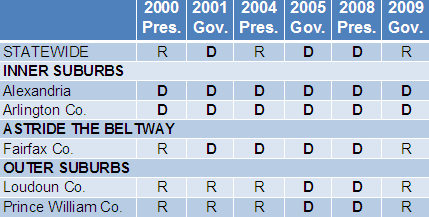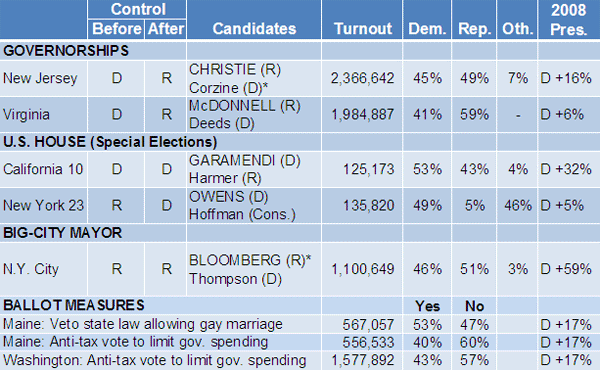'09 Elections: Some Parting Thoughts
A Commentary By Rhodes Cook
No doubt off-year elections can be overanalyzed. They are few in number. They sometimes give evidence of conflicting trends. And their predictive value for the midterm elections to follow has been rather conclusively debunked (see Alan Abramowitz's column here ).
Still, in a decade where the partisan political pendulum has stayed close to even-steven most of the time, even a limited pulse-taking like that on November 3 can provide some welcome clues as to the current state of the electorate.
Democrats fared worse last week, hit by a double whammy in the form of depressed turnout among party loyalists and a massive shift of independents to the GOP--at least the independents who showed up in 2009, which might have been a more conservative-leaning group than the larger number of independents who voted in 2008. The combination produced a pair of gubernatorial defeats in Virginia and New Jersey and a warning of potential trouble ahead for the Democrats in 2010.
But the Republicans did not emerge from this month's elections unscathed. Their loss of a historically GOP House seat in upstate New York exposed the party's own problem--their ongoing failure to win free-standing special congressional elections even on favorable terrain.
Often when a party is poised to make big gains in Congress, they first win a handful of seats from their opposition in special elections. That was the case for the Democrats on the eve of their huge congressional gains in the Watergate election of 1974. And it was true again for the Republicans in advance of their takeover of Congress in 1994.
But there has been no such harbinger as yet of a coming GOP tsunami in 2010. Rather, the loss in upstate New York marked the fourth time since the beginning of 2008 that the Democrats picked up a previously Republican House seat in a special election, with no similar takeaways by the GOP.
The Democratic special election gains have not been localized in one part of the country, but rather have been scattered across the map--two in the deep South, one in the Midwest and now one in the rural Northeast, a loss that transforms the partisan count of House seats in the Empire State to Democrats 27, Republicans 2.
GOP infighting contributed to the party's loss of the New York seat. Republican leaders nationally split their support between two candidates--the official party nominee (Dede Scozzafava), who was considered too moderate by many in the GOP, and the Conservative Party candidate (Doug Hoffman). He was regarded as the "truer" Republican by such potential 2012 presidential aspirants as Sarah Palin and Tim Pawlenty.
Scozzafava ended up quitting the race before the election, and she endorsed not Hoffman but Democrat Bill Owens. The latter won by 3 percentage points to become the first member of his party to represent parts of the district since the 19th century.
Chart 1. Democrats On a Roll in Special House Elections
With Bill Owens' victory last week in upstate New York, the Democrats have now picked up four previously Republican House seats in special elections since the beginning of 2008. Of the three won by the Democrats last year, one (the Louisiana 6th) was regained by the GOP in the 2008 general election. The others in Illinois and Mississippi are still in Democratic hands.
Note: In the New York 23rd, the Republican candidate, Dede Scozzafava, withdrew from the race before the election; Conservative Party candidate Doug Hoffman emerged as the runner-up.
Sources:
America Votes 28 (CQ Press) for the 2008 results; the website of the
New York Times for the nearly complete but unofficial returns for the 2009 contest. The 2008 presidential vote by congressional district is from the website of
Swing State Project.
Democrats had some candidate problems of their own in the gubernatorial elections. Both incumbent Jon Corzine in New Jersey and Creigh Deeds in Virginia ran largely negative campaigns that fell woefully short of activating the broad coalition of minorities, youth and independents that Barack Obama built to carry both states in 2008.
To be sure, the turnout for off-year and midterm elections is traditionally smaller, older, and whiter than for a presidential election. But the contraction of the Democratic coalition from 2008 to 2009 was dramatic.
The number of ballots cast in this year's gubernatorial election in New Jersey was 61% of the total cast in the 2008 presidential election; in Virginia, turnout this time was 53% of 2008. And the vote cast for the Democratic gubernatorial candidates in both states was less than 50% of the number of votes received by Obama last November.
Whether Democrats can rectify this problem of energizing the base without Obama himself on the ballot in 2010 is an open question. But for the time being, the Democrats have to assume they have a major turnout challenge on their hands.
In each of Virginia's 11 congressional districts, Deeds pulled less than half the vote that Obama received in 2008. In the rural 5th District that includes Charlottesville, he drew 45% of the Obama total. In the black-majority 3rd District, it was 39%. And in the trio of districts in suburban Northern Virginia that spread westward from the Potomac River--the 8th, the 11th and the 10th--Deeds polled 45%, 41%, and 37% of the 2008 Obama vote, respectively.
Deeds could only hold the liberal inner suburbs of Arlington and Alexandria that abut Washington, D.C. Populous Fairfax County and the outer suburbs of Loudoun and Prince William counties--all carried by Obama--were peeled away by Republican gubernatorial candidate Bob McDonnell this time around.
The Democrats' suburban collapse was not a problem unique to Virginia. It was replicated in Democratic New Jersey, where suburban Middlesex County (outside New York City) and Burlington County (outside Philadelphia) switched from the Obama column in 2008 to Republican gubernatorial candidate Chris Christie in 2009.
This may ultimately be the biggest test for Democrats in 2010--to reclaim the upper hand in the nation's suburbs. With the Democrats enjoying hegemony in the major cities and Republicans in rural and small-town America, the suburbs are the balance of power in 21st century politics, a major source of independent voters and the prime battleground for the two parties.
Suburban support was a cornerstone of Democratic victories in the elections of 2006 and 2008. But in 2009, the vote-rich suburbs of Virginia and New Jersey showed significant movement to the Republicans, giving them the upper hand in the gubernatorial contests in both states.
At a minimum, this year's electoral pulse-taking shows that the suburbs are not a Democratic preserve that the party can take for granted. They are what they have always been--independent-minded. Which way they tilt can decide elections--Virginia and New Jersey in 2009--and the nation as a whole next year.
Chart 2. Northern Virginia: Democrats' '09 Suburban Retreat
Much of the success of Virginia Democrats over the course of this decade has been due to the party's increasing dominance in the suburbs of Northern Virginia. But in 2009, the Democrats were pushed back to the Potomac River and the liberal bastions of Arlington and Alexandria that lie along it. They were the only major jurisdictions in the region that the Democratic candidate for governor, Creigh Deeds, was able to carry.
Sources: America Votes 24-28 (CQ Press) for elections from 2000-08; the website of the Virginia State Board of Elections for 2009.
Chart 3. 2009 Elections: Mixed Results in Key Contests
The results in this month's voting were decidedly mixed. Republicans captured the two governorships at stake, ending eight-year Democratic runs in New Jersey and Virginia. Democrats, however, won the two special House elections in Northern California and upstate New York, pulling the latter (a historically Republican district) into the Democratic column. In terms of ballot measures, a gay marriage law was repealed in Maine, while voters in Maine and Washington rejected anti-tax initiatives. In New York City, Mayor Michael Bloomberg--running again on the Republican ballot line--was reelected by an unexpectedly narrow margin.
Note: The names of winning candidates appear first and are capitalized. An asterisk (*) indicates an incumbent. New York City Mayor Michael Bloomberg has declared his political independence, but ran for reelection in 2009 on the Republican and Independence Party lines.
Sources: Results are based on nearly complete but unofficial returns from the websites of the state election boards in California, Virginia and Washington, as well as the website of the
New York Times and
WMTW Portland. The 2008 presidential vote by congressional district is from the website of
Swing State Project.
Rhodes Cook is a senior columnist at the Center for Politics at the University of Virginia
See Other Commentary by Rhodes Cook
See Other Political Commentary
Views expressed in this column are those of the author, not those of Rasmussen Reports.
Rasmussen Reports is a media company specializing in the collection, publication and distribution of public opinion information.
We conduct public opinion polls on a variety of topics to inform our audience on events in the news and other topics of interest. To ensure editorial control and independence, we pay for the polls ourselves and generate revenue through the sale of subscriptions, sponsorships, and advertising. Nightly polling on politics, business and lifestyle topics provides the content to update the Rasmussen Reports web site many times each day. If it's in the news, it's in our polls. Additionally, the data drives a daily update newsletter and various media outlets across the country.
Some information, including the Rasmussen Reports daily Presidential Tracking Poll and commentaries are available for free to the general public. Subscriptions are available for $4.95 a month or 34.95 a year that provide subscribers with exclusive access to more than 20 stories per week on upcoming elections, consumer confidence, and issues that affect us all. For those who are really into the numbers, Platinum Members can review demographic crosstabs and a full history of our data.
To learn more about our methodology, click here.






